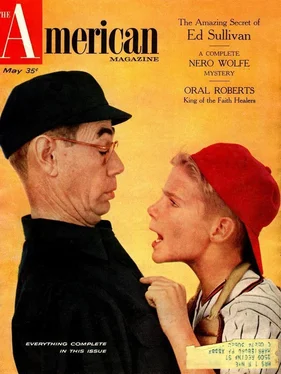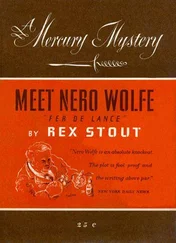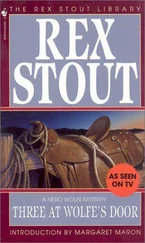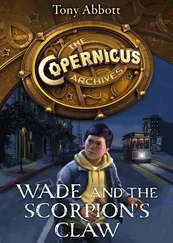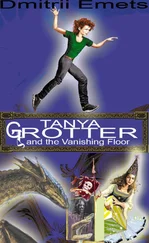Rex Stout - Nero Wolfe and the Vanishing Clue
Здесь есть возможность читать онлайн «Rex Stout - Nero Wolfe and the Vanishing Clue» весь текст электронной книги совершенно бесплатно (целиком полную версию без сокращений). В некоторых случаях можно слушать аудио, скачать через торрент в формате fb2 и присутствует краткое содержание. Год выпуска: 1956, Издательство: The American Magazine, May 1956, Жанр: Классический детектив, на английском языке. Описание произведения, (предисловие) а так же отзывы посетителей доступны на портале библиотеки ЛибКат.
- Название:Nero Wolfe and the Vanishing Clue
- Автор:
- Издательство:The American Magazine, May 1956
- Жанр:
- Год:1956
- ISBN:нет данных
- Рейтинг книги:4 / 5. Голосов: 1
-
Избранное:Добавить в избранное
- Отзывы:
-
Ваша оценка:
- 80
- 1
- 2
- 3
- 4
- 5
Nero Wolfe and the Vanishing Clue: краткое содержание, описание и аннотация
Предлагаем к чтению аннотацию, описание, краткое содержание или предисловие (зависит от того, что написал сам автор книги «Nero Wolfe and the Vanishing Clue»). Если вы не нашли необходимую информацию о книге — напишите в комментариях, мы постараемся отыскать её.
Nero Wolfe and the Vanishing Clue — читать онлайн бесплатно полную книгу (весь текст) целиком
Ниже представлен текст книги, разбитый по страницам. Система сохранения места последней прочитанной страницы, позволяет с удобством читать онлайн бесплатно книгу «Nero Wolfe and the Vanishing Clue», без необходимости каждый раз заново искать на чём Вы остановились. Поставьте закладку, и сможете в любой момент перейти на страницу, на которой закончили чтение.
Интервал:
Закладка:
Rex Stout
Nero Wolfe and the Vanishing Clue


I
Nero Wolfe, behind his desk, sat glaring at the caller in the red leather chair. I was swiveled with my back to my desk, ready with my notebook, not glaring.
Wolfe’s glare was partly on general principles, but more because David R. Fyfe had not phoned for an appointment. You might think it didn’t matter. There was the office, on the ground floor of the old brownstone house on West 35th Street. There was Wolfe in the chair he loved, sharpening his penknife on the old oilstone he kept in a drawer. There was I, Archie Goodwin, eager to earn my pay by serving his slightest whim, within reason. There was Fritz Brenner in the kitchen, doing the luncheon dishes, set to bring beer if the buzzer went one short and one long. There was Theodore Horstmann up in the plant rooms on the roof, nursing the ten thousand orchids. And there in the red leather chair was a guy who wanted to hire a detective or he wouldn’t have come. But for him and others like him Fritz and Theodore and I would have been out looking for jobs, and God only knows what Wolfe would have been doing. But Wolfe was glaring at him. He should have phoned for an appointment.
He sat forward in the red leather chair, not touching the back, his narrow shoulders sagging and his pale narrow face looking the worse for wear. I would have guessed his age at fifty, but most people look older than they are when forced by circumstances to go to a private detective. In a tired, careful voice, after giving his name and address and his occupation — head of the English Department at Audubon High School in the Bronx — he said he wanted Wolfe to investigate a confidential family matter.
“Marital?” Wolfe made a noise that went with the glare. “No.”
He shook his head. “It isn’t marital. I am a widower, with two children in high school. It’s about my brother Bertram — his death. He died Saturday night of pneumonia. It will have to be — I’ll have to explain about it.”
Wolfe sent me a glance, and I met it. If he let Fyfe explain he might have to work, and he hated to work, especially when the bank balance was healthy. But I tightened my lips a little as I met his glance, and he sighed and went back to the customer. “Do so,” he muttered.
Fyfe did so, and I took it down. His brother Bertram had suddenly appeared in New York a month ago, unannounced, after an absence of twenty years, and taken an apartment in the Churchill Towers, and communicated with his family — his older brother, David, who was doing the explaining, his younger brother, Paul, and his sister, Louise, now Mrs. Vincent Tuttle. They had all been glad to see him again after so many years, including Tuttle, the brother-in-law, and had also been glad to learn that he had hit a jack pot — not David’s word, his was bonanza — by finding and hooking onto a four-mile lode of uranium ore near a place called Black Elbow somewhere in Canada. It is always nice to know that a member of the family has made out well.
So they had welcomed Bertram, their brother Bert, and along with him a young man named Johnny Arrow who had accompanied him from Canada and was living with him in the Churchill Towers apartment. Bert had been fairly fraternal and had shown an interest in old memories and associations; he had even asked Paul, who was a real-estate broker, to get a line on the purchase of the old house in Mount Kisco where they had all been born and spent their childhood. Obviously Bert was back as one of the family. Ten days ago he had invited them to dine with him on Saturday the sixth, and afterwards go to the theater, but on Thursday he had been put to bed with pneumonia. He refused to go to a hospital, and insisted that they should dine at the Churchill as planned and use the theater tickets, so they gathered at his apartment late Saturday afternoon and carried out the program, returning to the apartment after the show for a champagne snack.
That is, four of them did — sister Louise and her husband, Johnny Arrow from Canada, and brother David himself. Younger brother Paul had maintained that Bert shouldn’t be left alone with the nurse, and had stayed at the apartment. When the four returned after the show they found a situation. Paul had gone and the nurse had a torn uniform and marks on her neck and cheeks and wrists. She had phoned the doctor to send another nurse and intended to leave as soon as her replacement came. Sister Louise resented some of her remarks and ordered her to leave at once, and she went. Louise phoned the doctor and told him she would stay until another nurse came. Johnny Arrow disappeared, leaving only David and Louise and her husband, Vincent Tuttle, on the scene; and after David had looked in at Bert on his sickbed, sound asleep under the morphine the nurse had given him by doctor’s orders he departed for home.
Louise and Tuttle went to bed in a room that was presumably Johnny Arrow’s, but were not yet asleep when a buzz took Tuttle to the door of the apartment, where he found Paul. Paul said he had been assaulted by Johnny Arrow down in the men’s bar, and had an assortment of bruises to show as evidence. Arrow had been escorted away by two cops. Paul thought his jaw was broken and possibly a rib or two, and he didn’t feel like driving home to Mount Kisco, so they put him on a couch in the living room, and in thirty seconds he was snoring, and after another glance in at the door of Bert’s room Louise and Tuttle went back to bed. Around six in the morning they were aroused by Paul. He had aroused himself by tumbling off the couch, had gone to look at Bert, and had found him dead. They phoned down to the desk for a doctor because Bert had insisted on having the old family doctor he knew in his boyhood, and they didn’t want to wait for him to get in from Mount Kisco. Of course they phoned him too, and he got there later.
Wolfe was fidgeting. He fidgets by making circles the size of a dime with a fingertip on his chair arm. “I trust,” he grumbled, “that the doctors will now justify your calling on me and this long recital. Or at least one of them.”
“No, sir.” David Fyfe shook his head. “They found nothing wrong. My brother died of pneumonia. Doctor Buhl — that’s the one from Mount Kisco, Doctor Frederick Buhl — he signed the death certificate, and my brother was buried Monday, yesterday, in the family plot. Of course the nurse having gone made the — uh — the situation was a little embarrassing, but no serious question was raised.”
“Then what the devil do you want of me?”
“I’m about to tell you.” Fyfe cleared his throat, and when he went on his voice was more careful than ever. “After the funeral yesterday that man Arrow asked us to come to the apartment at eleven o’clock this morning to hear the will read, and of course we went. Louise brought her husband along. There was a lawyer there, a man named McNeil who had flown down from Montreal, and he had the will. It had all the usual legal rigmarole, but what it amounted to was that Bert left his whole estate to Paul and Louise and me, and made that man Arrow the executor. It put no value on the estate, but from things Bert had said I would have thought his uranium holdings were worth upwards of five million dollars, possibly twice that.”
Wolfe stopped fidgeting.
“Then,” Fyfe went on, “the lawyer took another document from his brief case. He said it was a copy of an agreement he had drawn up a year ago for Bertram Fyfe and Johnny Arrow. He read it. There was a preamble about their prospecting together for uranium for five years, and their joint discovery of the Black Elbow lode, and the gist of it was that if either of them died the whole thing would become the property of the survivor, including any assets that had been acquired by the deceased through income from the mining property. That wasn’t the phraseology, it was all very legal, but that’s what it meant. As soon as he read it Johnny Arrow spoke up. He said that Bert had possessed nothing that had not been acquired with income from the Black Elbow uranium, and that therefore it was now legally his property, including large sums on deposit in Canadian banks, but that when Bert came to New York he had had some thirty or forty thousand dollars transferred to a New York bank, and he, Arrow, didn’t intend to claim what was left of it. That would be the estate and we could have it.”
Читать дальшеИнтервал:
Закладка:
Похожие книги на «Nero Wolfe and the Vanishing Clue»
Представляем Вашему вниманию похожие книги на «Nero Wolfe and the Vanishing Clue» списком для выбора. Мы отобрали схожую по названию и смыслу литературу в надежде предоставить читателям больше вариантов отыскать новые, интересные, ещё непрочитанные произведения.
Обсуждение, отзывы о книге «Nero Wolfe and the Vanishing Clue» и просто собственные мнения читателей. Оставьте ваши комментарии, напишите, что Вы думаете о произведении, его смысле или главных героях. Укажите что конкретно понравилось, а что нет, и почему Вы так считаете.
